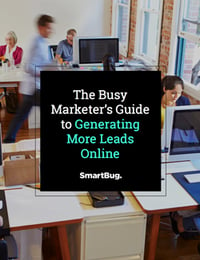
What Are Marketing Qualified Leads and Why Do They Matter?
April 19, 2017
By Sarah Hecker
Perhaps you’ve found yourself in this scenario before: Your most recent e-book has taken off on social media and has become your highest converting offer to date. As you excitedly pass the list of leads off to your sales team, you congratulate yourself for creating such a successful campaign.
But wait—a week later your sales team comes back to tell you all the leads were a bust. How could this be?
The fact of the matter is, not every lead that comes into your sales funnel will be qualified. This is why marketers use lifecycle stages to define and qualify leads, so neither marketing nor sales waste their time chasing down contacts who aren’t worth the effort. Instead of immediately passing your newly generated leads directly off to sales, you should have reviewed them further to determine which (if any) were marketing qualified leads (MQL) or sales qualified leads (SQL).
The Different Lifecycle Stages
Behavior is the key determining factor when it comes to setting a contact’s lifecycle stage. While the exact criteria vary from organization to organization, a high-level definition for each of the typical stages is as follows:
- Leads and Subscribers: Contacts who have given you an email address but haven’t revealed a lot of identifying data surrounding themselves yet. They can come from almost anywhere, typically a blog subscription or top of the funnel content offer.
- MQLs: Contacts who identified themselves as sales-ready and more deeply engaged than your usual leads but aren’t quite ready to be labeled as opportunities. Contacts who download your e-book might be considered marketing qualified leads if they meet the target industry, revenue, or business size you sell to.
- SQLs: Those whom your sales team has accepted as worthy of a direct sales follow-up. These contacts will have been more engaged with your content, requesting sales info or other bottom of the funnel offers, such as a demo request or free trial. These contacts would subsequently be qualified and deemed ready to move further down the sales funnel.
While SQLs may sound like the “important” leads, MQLs are just as important to a healthy sales funnel.
How to Determine Who Is an MQL
Deciding upon a definition of marketing qualified leads should be an organization-wide agreement. Depending on the needs of your business, there are a number of ways to decide if a contact is marketing qualified or not. Some of the most common criteria include:
- Demographic information
- Location
- Organization type
- Budget
- Lead score
- Actions or events on your website
- Similarity to past sales or opportunities
Using these criteria or creating automated lead scoring processes can help your filter through unqualified leads and focus on the ones that are a good fit for your business.
The Importance of MQLs
According to Gleanster Research, 50 percent of leads are qualified but not yet ready to buy. So while you may get one or two SQLs filling out a demo, consultation, or quote request form on your website in any given week—chances are you have many more leads who are visiting and converting on your website that just aren’t at that stage yet. Nurturing your marketing qualified leads is the only way to ensure that these contacts continue their way down the buyer’s journey toward purchasing your product or service.
Defining who is and isn’t an MQL also helps prevent scaring away contacts who aren’t ready to buy yet. If you bombard every lead who comes into your database with sales emails, it’s a surefire way to get them to hit the “unsubscribe” button. By segmenting your email campaigns according to lifecycle stage, you ensure you’re only sending messages to the contacts who are ready to receive them.
Don’t Forget About Your Marketing Qualified Leads
Similar to how not every SQL you generate will become a customer, not every MQL you create will be nurtured into a SQL. That doesn’t mean, however, that you can just ignore your leads and MQLs. To create a robust sales funnel, you must have ways to attract and convert leads at all stages of the buyer’s journey—from leads to customers. Additionally, it’s just as important to have a clear definition of your lifecycle stages, so you know which contacts to focus your marketing and sales efforts on.

About the author
Sarah Hecker was formerly a Marketing Consultant here at SmartBug Media. She has a passion for all things digital which catapulted her into the marketing world post-college. After being introduced to HubSpot during her first full-time job, she fell in love with inbound marketing. Read more articles by Sarah Hecker.







